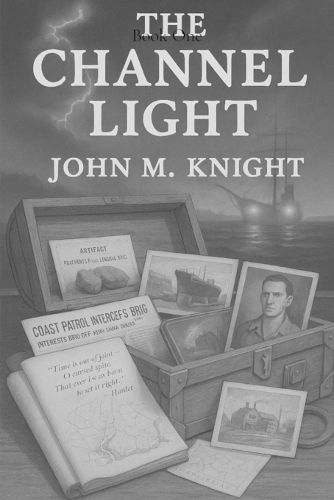Readings Newsletter
Become a Readings Member to make your shopping experience even easier.
Sign in or sign up for free!
You’re not far away from qualifying for FREE standard shipping within Australia
You’ve qualified for FREE standard shipping within Australia
The cart is loading…






This title is printed to order. This book may have been self-published. If so, we cannot guarantee the quality of the content. In the main most books will have gone through the editing process however some may not. We therefore suggest that you be aware of this before ordering this book. If in doubt check either the author or publisher’s details as we are unable to accept any returns unless they are faulty. Please contact us if you have any questions.
On the Gulf Coast of Florida, where storms move in with sudden violence, the Manatee River conceals more than tides and mud. In The Channel Light, past and present overlap in disquieting ways, drawing strangers together in a quiet pub where one story leads to another, and each telling unsettles the listener more deeply.
The frame is simple: a man takes refuge during bad weather, and a stranger, distracted over his book, becomes the reluctant teller of a tale. That tale-of a river crossing, a lost boat, and the old name of the Drowned Heron-spills outward into the main narrative, linking itself with the experiences of a researcher returned to Bradenton to examine neglected records of the Historical Society. His investigation, which begins in the dust of archives, leads him upriver, where warnings at the dock can be dismissed at first, but never entirely forgotten.
From there the story tightens: the river at night, its lights shifting under storm, channels that seem too closely watched, and an apparition glimpsed at the edge of the storm's fury. What begins as an academic task becomes a descent into a past pressing uncomfortably into the present, each clue drawing the protagonist closer to a reckoning with something older than memory and nearer than safety.
M. R. James held that the ghost story should unsettle by suggestion rather than spectacle. The Channel Light follows in that tradition, finding its terror in ordinary places thinned by history until they admit something else. The terror is not in gore or display, but in the way a familiar dock, an unnamed pub, or the bend of a river under lightning may be forced to carry a meaning that is no longer safe.
With appendices that lend documentary weight to the narrative, The Channel Light blends archival realism with uncanny atmosphere. It is a ghost story to be read by lamplight, where a gesture, a shoreline, or a forgotten name might suddenly bear the shadow of something that refuses to remain forgotten.
$9.00 standard shipping within Australia
FREE standard shipping within Australia for orders over $100.00
Express & International shipping calculated at checkout
Stock availability can be subject to change without notice. We recommend calling the shop or contacting our online team to check availability of low stock items. Please see our Shopping Online page for more details.
This title is printed to order. This book may have been self-published. If so, we cannot guarantee the quality of the content. In the main most books will have gone through the editing process however some may not. We therefore suggest that you be aware of this before ordering this book. If in doubt check either the author or publisher’s details as we are unable to accept any returns unless they are faulty. Please contact us if you have any questions.
On the Gulf Coast of Florida, where storms move in with sudden violence, the Manatee River conceals more than tides and mud. In The Channel Light, past and present overlap in disquieting ways, drawing strangers together in a quiet pub where one story leads to another, and each telling unsettles the listener more deeply.
The frame is simple: a man takes refuge during bad weather, and a stranger, distracted over his book, becomes the reluctant teller of a tale. That tale-of a river crossing, a lost boat, and the old name of the Drowned Heron-spills outward into the main narrative, linking itself with the experiences of a researcher returned to Bradenton to examine neglected records of the Historical Society. His investigation, which begins in the dust of archives, leads him upriver, where warnings at the dock can be dismissed at first, but never entirely forgotten.
From there the story tightens: the river at night, its lights shifting under storm, channels that seem too closely watched, and an apparition glimpsed at the edge of the storm's fury. What begins as an academic task becomes a descent into a past pressing uncomfortably into the present, each clue drawing the protagonist closer to a reckoning with something older than memory and nearer than safety.
M. R. James held that the ghost story should unsettle by suggestion rather than spectacle. The Channel Light follows in that tradition, finding its terror in ordinary places thinned by history until they admit something else. The terror is not in gore or display, but in the way a familiar dock, an unnamed pub, or the bend of a river under lightning may be forced to carry a meaning that is no longer safe.
With appendices that lend documentary weight to the narrative, The Channel Light blends archival realism with uncanny atmosphere. It is a ghost story to be read by lamplight, where a gesture, a shoreline, or a forgotten name might suddenly bear the shadow of something that refuses to remain forgotten.